Science fiction films have many warnings for us – not least, how the
road to a perfect future society is fraught with peril. Quentin Cooper
loads up the DVD player to see what lessons we can learn.
Science-fiction films sometimes offer us a future so bright we’ve got
to wear shades. But mostly we’re deluged with visions of tomorrows far
bleaker than today, from wildly unlikely “what if?” disaster scenarios
through to entirely plausible but still scary extrapolations of the
present.Doris Day may be right when she sings in Que Sera, Sera that “the future’s not ours to see” – for instance, I’m betting no-one saw that Doris Day namecheck coming until I made it – but at least these movies can flag up general directions we might be best steering clear of.
So what can we learn for society and our species to survive? Here is my spoiler-heavy list of the top nine things science-fiction films claim to teach us.
1. Avoid androids and AI
Artificial creatures that look and behave a lot like us also look a lot like a heap of trouble. Some androids are made bad, such as the original Terminator relentlessly coming after us, or Ash in Alien, betraying everyone through its lack of humanity. Others soon get that way through malfunction or rebellion, like the gunslinger in Westworld which starts shooting to kill, or the replicants in Bladerunner willing to take human lives to extend their own.
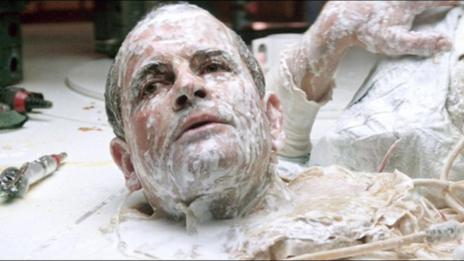
Ash in Alien (20th Century Fox)
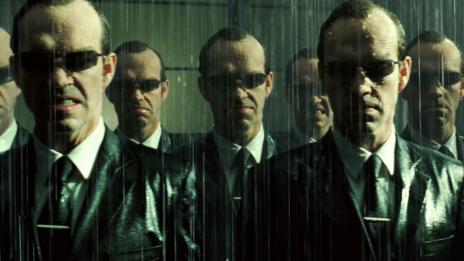
The Matrix (Warner Bros)
It’s a common theme that systems designed to protect us end up reaching the not entirely illogical conclusion that the greatest threat comes from people (in Colossus: The Forbin Project the US and Russian defence supercomputers join forces to take over the world.)
Again, we’re in the technophobic territory of being scared our creations will turn against us, part of that wider mistrust of science and scientists that goes back to Mary Shelley’s Frankenstein and beyond.
See also: Robo-Maria in Metropolis, robot Bill and Ted in their Bogus Journey, David in Prometheus, all The Stepford Wives, Tron, I, Robot, Demon Seed.
2. Machinery plus weaponry equals catastrophe
Whatever they look like, it’s a general rule that anything artificially intelligent is really inconvenient, if it is armed it’s probably disastrous, and if it’s in charge of nukes then it may well be apocalyptic.
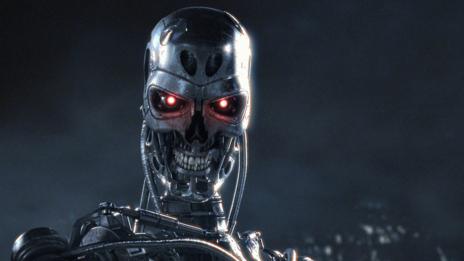
Cyborg in Terminator (Tristar)
The take-home message is that no nukes is good news, and no weapons in the hands of anything artificially intelligent is even better. (Discounting the fact that these malign machines rarely have actual hands.)
See also: On The Beach, The Day The Earth Caught Fire, Robocop, The Iron Giant.
3. Ban human cloning
At best you have to wade through the ethical quagmire of individuals raised only to be organ donors or cheap labour (Never Let Me Go, The Island, Moon); at worst you create a vast army and start a pan-galactic conflict (Star Wars Episode II: Attack of the Clones). In between this comes your genes sealing your fate (Gattaca’s genetically determined class system), manipulating DNA to create superhumans who then turn against us (Star Trek II: Wrath of Khan and Into Darkness), and frightening fusions of humans and other creatures (Alien: Resurrection, The Fly). And that still leaves genetically modified viruses, plants and animals.
See also: The 6th Day, The Boys from Brazil, Rise of the Planet of the Apes remakes; Jurassic Park.
4. Control the state or it will control you
Science fiction’s predictive properties are highly debatable, but what it is good at is exploring present-day situations in a stripped-down way. So whenever future societies are seen on screen – whether the film is set just a few years from now or millennia, on Earth or among alien races on distant planets – they almost invariably echo or extrapolate what’s happening in the here and now. And although the politics vary, what’s consistent are the warnings about leaders and administrations becoming too powerful, bureaucratic and interfering.
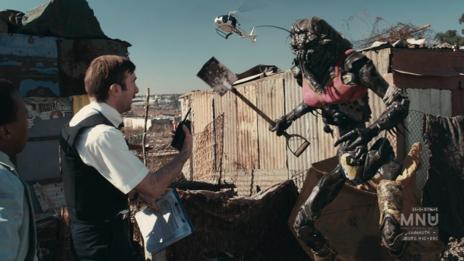
District 9 (Tristar)
Many films – such as Brazil or Fahrenheit 451 – are set within oppressive regimes. Some are even more totalitarian, keeping the population under control by dividing them (the alien ghetto in District 9, the slums for the masses on Earth and space station for the elite in Elysium), drugging them (THX 1138), distracting them (the titular mass entertainment of Death Race 2000 and The Hunger Games), or doing them in (in Logan’s Run everyone lives in a computer-controlled utopia, but life ends at 30).
See also: Serenity; Demolition Man; In Time.
5. Beware large corporations
With the honourable exceptions of Wayne Enterprises in Batman and Stark Enterprises in Iron Man, any big company in sci-fi is usually a bad one. And the bigger they are, the shadier they get. Particularly ruthless are Omni Consumer Products in Robocop controlling every aspect of life from basic goods to government, and the Soylent Corporation in Soylent Green who quietly decide to overcome food shortages by feeding the masses to themselves. But perhaps the ultimate in conglomerated evil is Weyland-Yutani in the Alien franchise: always willing to make sacrifices – “crew expendable” is the directive they send in the first film – to further its own ends.
See also: The Buy-N-Large Corporation in WALL-E, Tyrell Corporation in Bladerunner; Cyberdyne Systems in the Terminator franchise.
6. One world – try to preserve it
Science fiction often depicts humanity as having spread out across the Universe. That may eventually be how our species can survive, plundering other worlds for resources like in Outland (mining titanium on Jupiter’s moon Io) and Avatar (picking a fight with peaceful blue aliens because they’re sitting on reserves of amusingly named mineral unobtanium).
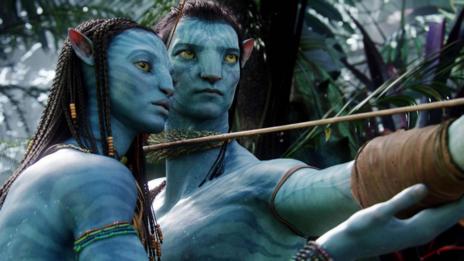
Zoe Saldana and Sam Worthington (20th Century Fox)
See also: Silent Running, Godzilla vs Hedorah, Red Planet, The Core.
7. Watch the skies
Through no fault of our own, cosmic trouble can come looking for us. So if we keep on the lookout we might at least be marginally better prepared. It could be a full scale invasion from aliens that for no given reason have singled out Earth as ripe for conquest (Independence Day, Mars Attacks! to name but two), a rogue extra-terrestrial causing trouble (The Thing, Cloverfield, Super 8), our planet happening to be where aliens get into a scrap (Transformers, Alien vs. Predator) or just a raid on our planet for resources (in Cowboys vs Aliens they’re after gold, in This Island Earth it’s uranium and scientists).
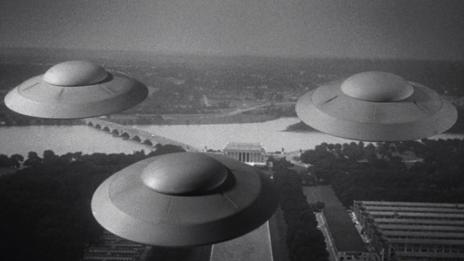
Earth vs the Flying Saucers (Columbia)
See also: Earth vs The Flying Saucers, Battlefield Earth, Village of the Damned, The Faculty.
8. Say no to superheroes
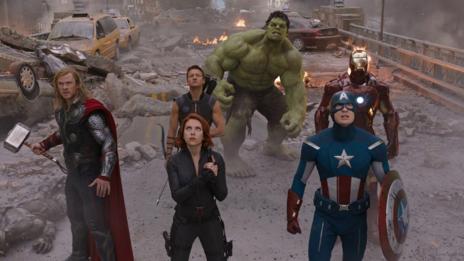
The Avengers (Walt Disney)
See also: Batman, Spiderman, Watchmen.
9. Stay put
Maybe all this space exploration is just plain bad for us. Not sending humans to the stars would mean no risk of anyone being terrified away from terra firma (Alien, Event Horizon), or bringing back nasty creatures (Alien: Resurrection, Lifeforce), or drawing attention to Earth so aliens attack it (Starship Troopers, assorted Star Treks, Apollo 18).

No comments:
Post a Comment